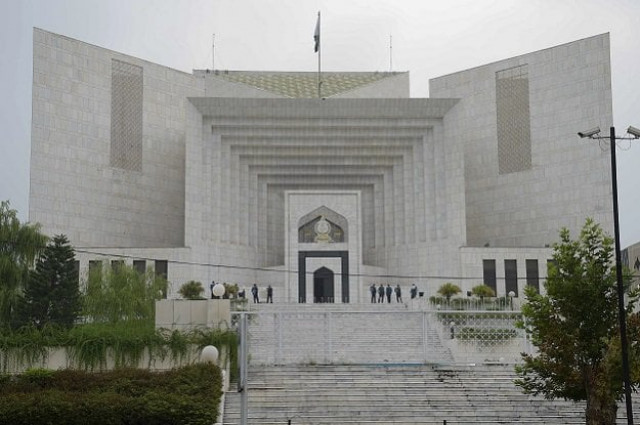'Ministry of Law at fault' for Nandipur cost hike
Says officers, officials of ministry failed to exercise authority lawfully

Allows a sacked serviceman to enjoy pensionary benefits. Supreme Court of Pakistan. PHOTO: AFP
It was during the Pakistan Peoples Party (PPP)-led government that a petition against the delay was filed by former foreign minister and the Pakistan Muslim League-Nawaz (PML-N) leader Khawaja Asif in 2011.
The apex court on October 26, 2011 constituted a commission to probe into the delay and assigned the task to Justice (retd) Rahmat Hussain Jaffri. The commission examined the relevant witnesses and submitted its report on April 9, 2012.
PAC directs inquiry into Nandipur project MD’s appointment
Later, the Ministry of Water and Power referred the case to NAB in the light of the judicial commission’s report on the hydropower project. NAB later converted a formal inquiry into the alleged delay in the project into an investigation on January 22, 2018.
The Nandipur power project was approved by the Economic Coordination Committee on December 27, 2007 at a cost of $329 million. After approval, the contract was assigned on January 28, 2008 to the Northern Power Generation Company (DEC) China.
The Ministry of Finance issued sovereign guarantee on October 31, 2009 but the law ministry replied that the legal opinion could not be issued on a document, which was never cleared by this division.
The issue was resolved through the federal cabinet on August 24, 2011. Later, legal opinion was issued by the law ministry on October 19, 2011 after a delay of two years.
SC orders NAB to expedite Nandipur investigation
The report says the ministry had refused to issue legal opinion on the grounds that it did not vet agreement and the rules of business 1973 do not allow to grant “ex post facto” approval.
The Ministry of Water and Power repeatedly requested the ministry to issue the legal opinion but all in vain. Hence, the agreement could not be executed due to conflict between the Ministry of Law and Ministry of Power and a delay of more than two years occurred in the execution of the finance agreement.
The total loss due to non-issuance of legal opinion by the law ministry in Nandipur power project amounts to Rs27. 3 billion, the report says.
Giving details of the breakup, it says Rs20 billion is the difference between PC-1 and the revised PC-1 purely due to escalation cost and variation in exchange rate and Rs4.36 billion was paid to the Chinese company for remobilisation and EOT cost and repair, replacement and repacking.
An amount of Rs2.1 billion was paid as markup on loans.
The report states that during the investigation, it was found that officers and officials of the law ministry failed to exercise their authority lawfully and committed the offence of corruption and corrupt practices as defined under Section 9 (a) (vi) and (xii) of the NAO.
The accountability watchdog adds that it possesses all relevant record from both the ministries and the statements of the accused and witnesses are being recorded.
Meanwhile, submitting a reply in the National Reconciliation Ordinance (NRO) case, the law ministry told the SC that the Swiss authorities on February 4, 2013 conveyed to Pakistan that the proceedings against former president Asif Ali Zardari could not be resumed because they had been formally closed by a decision that has come into force.
The reply said taking any action against misappropriation of property, corruption and misuse or abuse of power is the duty of NAB, which is fully independent and empowered to make any administrative decision for the recovery of any loss to the national exchequer.
The law ministry under the Rules of Business 1973 is not mandated with the task of accountability or the recovery of any allegedly embezzled amount. Advocate Feroz Shah Gilani moved a petition in the apex court for the recovery of losses Pakistan had incurred after the promulgation of the NRO in 2007.



















COMMENTS
Comments are moderated and generally will be posted if they are on-topic and not abusive.
For more information, please see our Comments FAQ